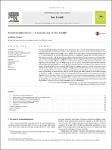Xenotransplantation — A special case of One Health
Denner, Joachim
The chronic shortage of human transplants to treat tissue and organ failure has led to the development of xenotransplantation, the transplantation of cells, tissues and organs from another species to human recipients. For a number of reasons, pigs are best suited as donor animals. Successful, routine xenotransplantation would have an enormous impact on the health of the human population, including the young, who sometimes require a replacement organ or islet cells, but especially the elderly, who more often suffer the consequences of organ failure. The first form of xenotransplantation applied to humans is the use of pig islet cells to treat insulin-dependent diabetes, a procedure that will have a significant economic impact. However, although xenotransplantation using pig cells, tissues and organs may save and prolong the lives of patients, it may also be associated with the transmission of porcine microorganisms to the recipient, eventually resulting in emerging infectious diseases. For this reason, the health of both the donor animals and the human recipients represents a special and sensitive case of the One Health concept. Basic research leading to strategies how to prevent transmission of porcine microorganisms by selection of virus-free animals, treatment of donor pigs by antiviral drugs, vaccines, colostrum deprivation, early weaning, Caesarean delivery, embryo transfer and/or gene editing should be undertaken to supply an increasing number of potential recipients with urgently required transplants. The methods developed for the detection and elimination of porcine microorganisms in the context of xenotransplantation will also contribute to an improvement in the health of pig populations in general and an increase in the quality of meat products. At present, there is evidence for transmission of porcine viruses to humans eating pork and having contact with pigs, however the impact of these viruses on public health is still unknown.
No license information

